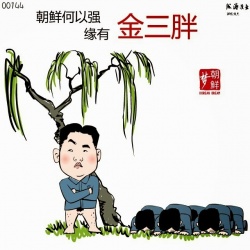The Word of the Week comes from the Grass-Mud Horse Lexicon, a glossary of terms created by Chinese netizens or encountered in online political discussions. These are the words of China’s online “resistance discourse,” used to mock and subvert the official language around censorship and political correctness.
金三胖 (Jīn Sān Pàng)

(“How did North Korea get strong? Because of Kim Fatty III.” Inspired by a Global Times Chinese dream ad. (Artist: Cheng Tao 成涛)
Kim Jong Un inherited leadership after his father’s death in December 2011. While China’s state media expressed condolences for Kim Jong Il’s death, Chinese netizens immediately began lampooning his chubby son. Kim Jong Un quickly became “Kim Fatty III.”
China is one of North Korea’s only allies. Over the years, the Chinese public has grown increasingly uneasy with this diplomatic relationship.
Example: Weibo users commented on Kim Jong Un’s 40-day disappearance in fall 2014:
Xuanhuwencha (@悬壶问茶): I asked Uncle Doorman, “Why does Kim Fatty III have to play hide-and-seek? Uncle Doorman (Menweidaye @门卫大爷) says, “Fatty III has three goals: one, to test the loyalty of his cadres; two, to see how the U.S., U.K., Japan, and South Korea react; and three, to slap Chinese intellectuals in the face. (October 14, 2014)
我问门卫大爷:金三胖为什么要玩捉迷藏呢?@门卫大爷说:三胖玩捉迷藏有三个目的:1、考考干部队伍的忠诚度;2、看看美英日韩的反应;3、打打中国公知的脸。 [Chinese]
On November 8, 2016, netizens discovered that searches for “Kim Fatty III” yielded no results on Weibo or Baidu. Some attempted to explain the lack of results by guessing that North Korean leaders had asked their allies in Beijing to root out the disrespectful term. Netizens also shared screenshots of an unconfirmed news story headlined “North Korea Requests Chinese People Respectfully Address Kim Jung Un, Not Call Him Other Names or Kim Fatty III!” (朝鲜要求中国人必须尊称金正恩,不许直呼其名也不能称呼为金三胖!) In the days that followed the blocking, netizens continued to poke fun at the young dictator (and discuss the original moniker’s sensitivity) by using “金三月半” (Jīn Sān Yuèbàn, literally “Kim 15th-of-the-month III”), splitting the character 胖 (Fatty) into its component parts.
The phrase had earlier been blocked from Weibo search results in September of 2013.
See also West Korea.
Can’t get enough of subversive Chinese netspeak? Check out “Decoding the Chinese Internet: A Glossary of Political Slang,” our ebook of dozens of new terms and classic catchphrases, presented in a new, image-rich format. Available for pay-what-you-want (including nothing). All proceeds support CDT.








